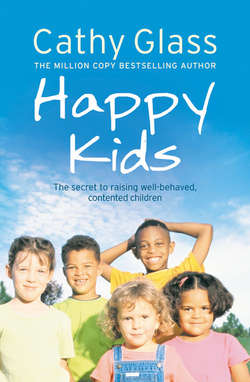Happy Kids: The Secrets to Raising Well-Behaved, Contented Children

Реклама. ООО «ЛитРес», ИНН: 7719571260.
Оглавление
Cathy Glass. Happy Kids: The Secrets to Raising Well-Behaved, Contented Children
Happy. Kids
Copyright
Contents
Introduction: Why?
CHAPTER ONE First Years. Baby and the 3Rs: 0–1
Sleep
Request, Repeat and Reassure
What not to do at night
Daytime routine
Toddler and the Terrible Twos: 1–3
Terrible twos
Smacking
Tantrums
Rewards
Be consistent
Some Techniques
Positive rather than negative
Control
Should you use the naughty chair?
Don’t use the third person
Sanctions and rewards
The closed choice
CHAPTER TWO Preschool. Rising Five: 3–5
Nursery
The morning routine
Regression
Nursery anxieties
Behaviour and character
CHAPTER THREE More Techniques
The importance of respect
It’s the behaviour that’s wrong
Time out
Restraining
Play and being playful
CHAPTER FOUR School. Starting School: 5–8
School influence
Don’t over-react
Bullying
Being disliked by your child
Cause and effect
Taking responsibility for bad behaviour
Big Fish in a Little Pond: 9–11
When your child compares you
Getting the balance right
Don’t compare your child
Peer pressure – yours
Child overload
The 3Rs work miracles
Disciplining your child’s friends
CHAPTER FIVE Factors Affecting Behaviour. Stress Factors
Bereavement
Divorce or separation
Redundancy
Moving house
World events
Other factors which can affect children’s behaviour
Siblings
Reasons children fight
Dos and don’ts of parenting siblings
CHAPTER SIX Difficult Children. Turning around a Difficult Child
Is your child out of control?
Regaining control
Zero tolerance
Address the key issues
Decide on a routine
Hold a family meeting
Use the 3Rs
Confrontation
Quality time
Allow time
Progress
Prioritise and insist on politeness
Rudeness and aggression
Being demanding
Impudence
Interrupting and talking over
Selfishness
Throwing things
Blackmail
Maintaining Control
Body language
You lead
Your chair
Your phone
Your conversation
Food
Family norm
No excuses
Reforming Siblings
First steps
Begin
Strategies to use
CHAPTER SEVEN Not Your Own. Step-parents
Young stepchildren
Older stepchildren
Observe
Don’t criticise the other parent
Use what works
Prepare to be tested
If they’re out of control
Bonding and fairness
Don’t blame the stepfamily
Step-parenting essentials
Acting Parents
Routine and boundaries
Acceptable behaviour
Regular stays
Known behavioural difficulties
Long stays or permanent
Teachers
Presence
Gaining attention
Use voice modulation
Be positive
Be aloof
Avoid over-familiarity
Keep your distance
Use the 3Rs
Don’t reward bad behaviour
No discussion
Teaching assistants
Children’s home life
Class dynamics
Use time out
Respect
Others who Look after Children
Nursery and preschool staff
Childminders
Relative or close friend
Nannies
CHAPTER EIGHT Other Factors. Diet
Food additives and behaviour
Effect of vitamins and minerals on behaviour
Sugar high
Caffeine
Fluid
Special Needs
Attention Deficit and Hyperactivity Disorder (ADHD)
Autistic spectrum disorders and Asperger’s syndrome
Behavioural disorders
Bipolar disorder
Attachment disorder
CHAPTER NINE Metamorphosis. Pre-teen and Early Teen: 11–15
The golden rules for managing pre-teen and early teens
Attitude
Bad language
Image
Unwelcome habits
Bedrooms
House rules
Truancy
Sanctions for teens
Rewards for teens
Using the 3Rs with teens
Remember
Older Teen: 15–18
Peer group influence
Smoking, alcohol and drug abuse
Sex and relationships
CHAPTER TEN Grown Up. Young Adults
How mature?
New rules and expectations
In trouble
Enjoy
Conclusion
Remember
Index
About the Publisher
Отрывок из книги
Cathy Glass
The secret to raising well-behaved, contented children
.....
Much of managing a child’s behaviour is about control – yours and the child’s. Clearly you should not be a control freak, trying to remove all traits of assertion or individuality from your child. But children of all ages need their parents to be in control and to guide them. Every day brings new situations for the developing child, where decisions have to be made, advice given and control implemented by you.
Before you ask a child to do something, or stop him from doing something, always make sure what you are asking is a reasonable and necessary Request. You will know if it is reasonable because there will be a reason attached to it – ‘Tom, please don’t pull the cat’s tail. It’s unkind and hurts the cat.’ This is a reasonable Request and you can see it through using the 3Rs.
.....